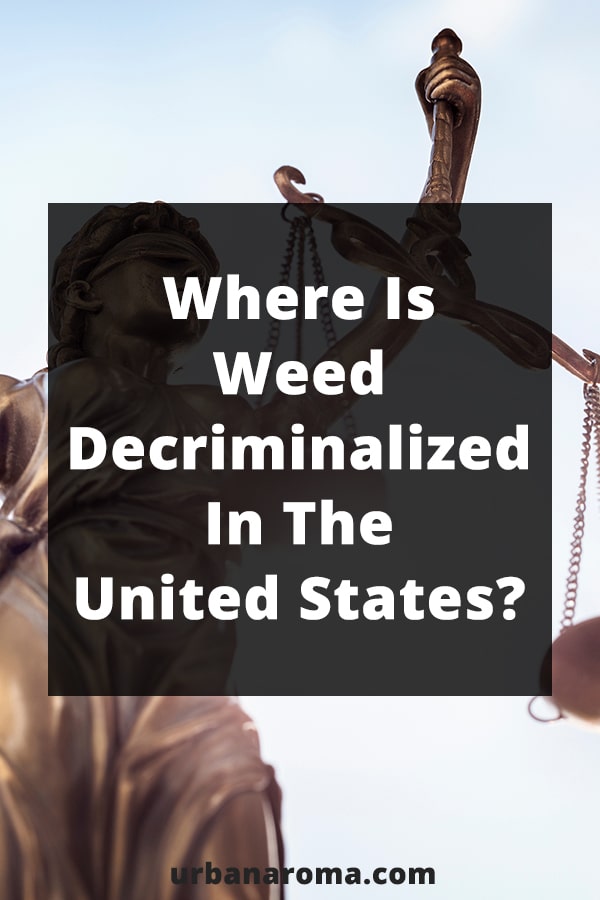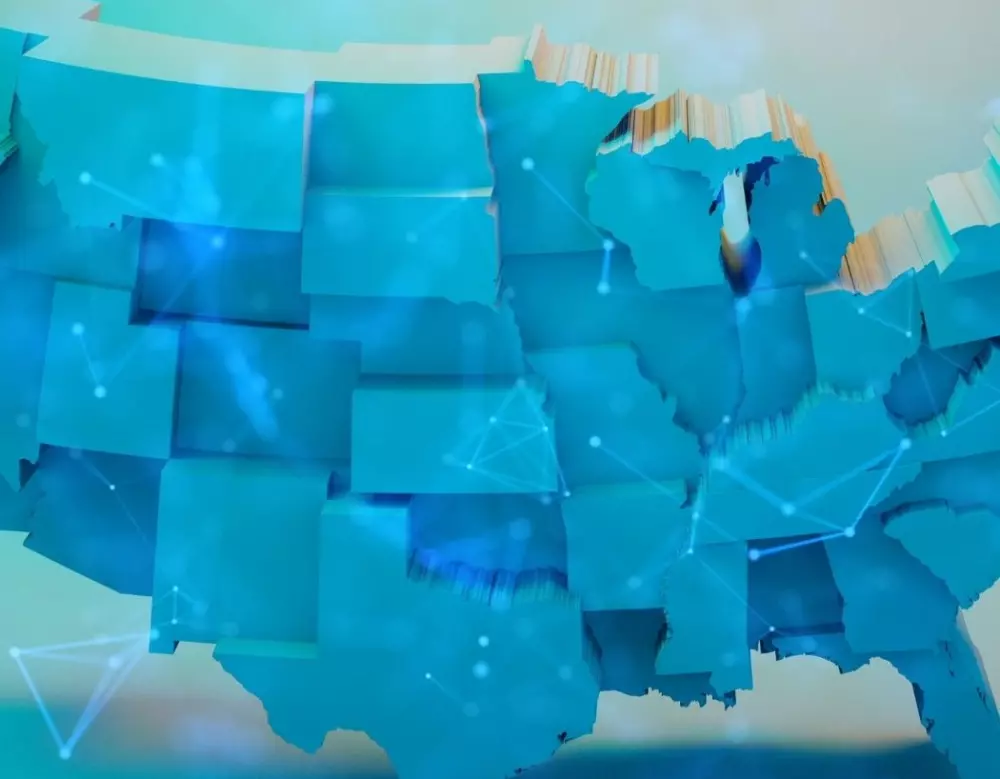If you are an avid cannabis consumer, you're lucky if you live in a state where marijuana use for medical and adult use a.k.a. recreational purposes has been legalized at the state level (cannabis is still illegal under federal law).
People in other states aren't as lucky. In many US states, possessing marijuana in any amount is breaking the law. You can be subject to steep fines and even jail time, depending on how much cannabis you're arrested with.
Even though 1 in 3 Americans now lives in a state with legal adult-use cannabis laws, other areas of the United States are just as strict as they ever were. However, even in some places where marijuana is still criminalized, there has been some easement of penalties.
What Does Decriminalization Mean?
Some US states have chosen to decriminalize marijuana possession. Decriminalization of cannabis simply means that rather than being classified as criminal conduct, possession and consumption is now treated as a civil infraction, sometimes incurring a fine. It also makes the activity a low priority for law enforcement.
Many states have legalized medical marijuana. Some of those states have decriminalized cannabis as well. While decriminalization does not mean marijuana possession is legal, it does reduce the consequences of possessing it.
If you only have to pay a small fine and avoid getting a criminal record, then it's much less scary to be caught with cannabis. However, in most states that have decriminalized marijuana, if you're growing it, or have a large amount in your possession, the consequences could still be severe.
Does Decriminalization Have The Same Rules Everywhere?
What defines decriminalization differs from state to state. Each state determines its own laws when it comes to legalizing or decriminalizing marijuana.
As of the November election, 15 states and Washington, DC have legalized marijuana for recreational use: Alaska, Arizona, California, Colorado, District Of Columbia, Illinois, Maine, Massachusetts, Michigan, Montana, New Jersey, Nevada, Oregon, South Dakota, Vermont, and Washington. A total of 35 states and DC have medical marijuana programs.
The States With Decriminalized Marijuana Laws
Connecticut
In 2011, the state made it a civil penalty for possession of a half-ounce or less of marijuana. It could be punishable by a fine of up to $150, but it would no longer include jail time. Future offenses were increased to $200-$500. If you have a third violation, you will be referred to a drug awareness program.
In addition to the fine, if you are under the age of 21 and possess of a half-ounce of marijuana or less, you could have a 60-day suspension of your driver's license.
Delaware
Delaware's HB 39 bill took effect in December 2015. It decriminalized marijuana by making possession by adults of up to one ounce of marijuana punishable by a fine of $100 and no jail time. In July of 2019, bill SB 45 was signed into law, expanding decriminalization to anyone under 21 years old.
Hawaii
In January 2020, the legislature passed a bill to decriminalize possession of three grams or less of marijuana with a fine of $130. Three grams is the smallest amount allowed by any state that has decriminalized marijuana so far. Before decriminalization, you could be fined up to $1000 and jailed for up to 30 days.
Maryland
Currently, in the state of Maryland, possession of 10 grams of marijuana or less for recreational use by adults has a fine of up to $100. Future offenses could result in higher fines. If you have a fourth offense or possess more than 10 grams, it could result in a misdemeanor with up to one year in jail time and a $1000 fine.
Minnesota
When Minnesota's Senate bill 364 was passed in 2014, it made possessing less than 10 grams of recreational marijuana for personal use a civil offense. It would have a maximum fine of $100 and carries no jail time. It remains a criminal offense to possess over 10 grams of marijuana. Possessing up to 50 pounds of marijuana is a misdemeanor punishable by a $1000 fine and up to one year in jail. Quantities over 50 pounds is a felony.
Mississippi
In the state of Mississippi, the first offense of possession of 30 grams (a bit more than an ounce) of marijuana) is punishable by a fine of $250. You will be issued a civil summons instead of being arrested if you have proof of identity and provide a written promise to show up in court.
Missouri
In the state of Missouri,10 grams or less of marijuana was decriminalized in 2014. It is punishable by a fine only. However, the offense remains a criminal misdemeanor. Possessing more than 10 grams of marijuana could result in jail time.
New Hampshire
The decriminalization bill HB 640 was signed into law on July 18, 2017. This law reduced penalties for possessing three-quarters of an ounce or less of cannabis to a civil violation instead of the previous criminal misdemeanor. A first and second offense for adults 18 years and older within a three year period carries a $100 civil fine. A third offense within 3 years is a $300 fine. A fourth offense within 3 years can be charged as a Class B misdemeanor with a fine up to $1200. Those in possession of the amounts declared above will no longer be arrested unless they refuse to identify themselves or lie about their identity. Minors in possession of marijuana can be taken into custody.
In 2019, bill HB 399 allowed people who received misdemeanor convictions for possessing minor amounts of marijuana before decriminalization to have their records annulled. This bill took effect on January 1, 2020.
New Mexico
Bill SB 323 was signed into law on April 3, 2019. It decriminalized possession of up to half an ounce of marijuana. It has a penalty of a $50 civil fine and no jail time. A poll commissioned by the governor found that 3 out of 4 voters in New Mexico supported the legalization of marijuana for adults in their state.
New York
Bill A08420/S06579 was signed into law by Gov. Andrew Cuomo in 2019. The bill reduced the penalty for marijuana possession of up to one ounce to a $50 fine from a $100 fine. It also added automatic expungement for past convictions. It closed the loophole of public view that law enforcement had used as a pretext to arrest thousands of New Yorkers. It automatically erases old convictions for decriminalized conduct.
North Dakota
In North Dakota, House Bill 1050 eliminated jail time penalties for adults 21 and over for anyone that possessed up to one ounce of marijuana in may of 2019. The new law went into effect in August of last year. If in possession of marijuana up to one-half ounce is punishable by no jail time and a maximum fine of $1000.
Ohio
If you are not registered as a medical marijuana patient, being caught with 100 grams or less of marijuana or giving 20 grams or less of marijuana to another person, is punishable by a maximum fine of $150. It is considered a misdemeanor even if you are growing less than 100 grams of marijuana. A minor misdemeanor is not an offense that requires jail time, but your driver's license may be suspended for a period of six months to five years.
Rhode Island
If you are caught with small amounts of marijuana in Rhode Island, it is decriminalized. If you possess one ounce or less, it is punishable by a citation of $150 for the first offense. The fine could increase if it's not paid on time. If you receive three citations within 18 months, you might be charged with a misdemeanor. If you are a minor under the age of 18, you will be required to appear before family court and will be evaluated for substance misuse disorder. In addition to that, you will have to pay a fine of $150.
Virginia
In May 2020, bill SB/ HB 972 was signed into law in Virginia. It decriminalized up to one ounce of marijuana in the state. Virginia was then the 27th state to decriminalize simple marijuana possession in the United States. The new law went into effect in July 2020. Under the state's new law, possession of marijuana in the amount of one ounce or less is a civil penalty. It is punishable by a fine of $25.

